Daniella DiPaola Will Answer Questions on Skills from Students – Artifacts from a Robot Interaction Design Curriculum for Fifth Grade Students
Daniella DiPaola will lead two live Demo Q&A sessions on Skills from Students – Artifacts from a Robot Interaction Design Curriculum for Fifth Grade Students at #werobot. The first session will be held at 3:15pm on Friday, September 24th; the second session will be held at 11:00am on Saturday, September 25th. We suggest viewing the […]
